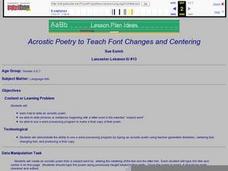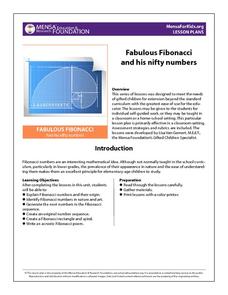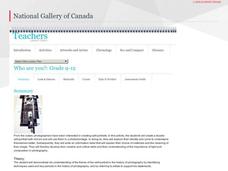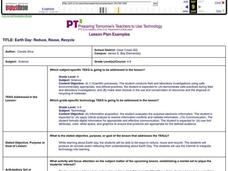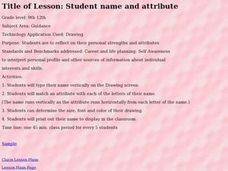Curated OER
Acrostic Poetry to Teach Font Changes and Centering
Young scholars engage in a discussion about how to write an acrostic poem. They demonstate the ability to use a word processor by typing an acrostic poem by following instructions. Word processing skills such as, centering text, changing...
Curated OER
A Hidden Beauty
Expose the beautiful mystery of bulbs as young botanists learn all about these fascinating plants. They glean information from a short text before observing actual bulbs (consider an onion), and comparing their findings with predictions....
Curated OER
Everyone Can Write Poetry
Embark on a journey of writing several different types of poetry. Fifth graders read several examples, and use the examples to model their own writing. Each poem is to be accompanied by a different art visual representation. In the end,...
K20 LEARN
From Apples To Oranges: Examining Literary Devices
Make learning the definitions of literary terms memorable with a fun and engaging activity. Teams of scholars are given several terms and create an acrostic poem with simplified definitions and examples.
MENSA Education & Research Foundation
Fabulous Fibonacci and His Nifty Numbers
Fibonacci numbers are not only found in the classroom but also in nature. Explore the concept of Fibonacci numbers through a series of lessons designed to gain insight into the mathematical reasoning behind the number pattern, and spark...
Curated OER
No Need To Be Puzzled About Me
Fourth graders investigate acrostic poetry by researching the Internet. In this poetry writing lesson plan, 4th graders complete a worksheet detailing their personal activities and interests. Students view the form of an acrostic poem...
Curated OER
Who Are You?
Students complete self projects such as a collage, an acrostic poem, a mural, and more, to show their similarities and differences. In this similarities and differences lesson plan, students can do these projects individually or in groups.
Curated OER
Poetry Anthology of Basic Forms
Students explore the format of the following poetic forms: acrostic, haiku, cinquain, diamente, and free-verse.They create a handbook or anthology of these poetic forms, with at least one sample of original work in each format.
Curated OER
A Hidden Beauty
Expose the beautiful mystery of bulbs as young botanists learn all about these fascinating plants. They glean information from a short text before observing actual bulbs (consider an onion), and comparing their findings with predictions....
Curated OER
Earth Day: Reduce, Reuse, Recycle
Young scholars list ways to reduce, reuse and recycle, and produce an acrostic poem reflecting their understanding about Earth Day. They also use the Internet to integrate technology into learning.
Curated OER
Student name and attribute
Students create an acrostic poem using their name and drawings that describe them.
Curated OER
Polar Pals: Polar Bears & Penguins
First graders complete a variety of activities about polar bears and penguins including the "Blubber Mitten" experiment. They culminate the unit by creating a visual representation comparing and contrasting the two animals.
Curated OER
Rhyming Fruits and Vegetables
Students describe fruits and vegetables using rhyming verses. They discuss the Five Fruits and Vegetables a Day campaign and rhyming words, and create a rhyming riddle using the "Rhyming Riddles" worksheet.


